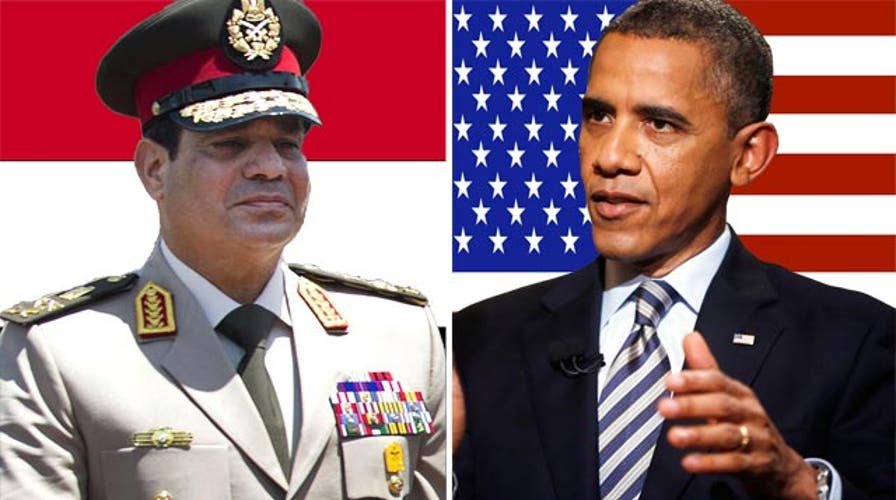This is a rush transcript from "Special Report," October 9, 2013. This copy may not be in its final form and may be updated.
(BEGIN VIDEO CLIP)
JAY CARNEY, WHITE HOUSE PRESS SECRETARY: We will continue to work with the interim government to promote our core interests and to support areas that benefit the Egyptian people. The president was also clear and has been clear that we are not able to continue with business as usual.
NORM COLEMAN, R – MN, FORMER SENATOR: The sense is that the Obama administration was supporting the Muslim Brotherhood. People say they won the election. Hitler won an election. Hamas won an election. A democracy is not about winning an election one time. It's about a relationship between the people and government. And Morsi put himself above the judiciary, starting stepping on the rights of women. More than 20 million Egyptians in the streets saying we have to make change.
(END VIDEO CLIP)
BRET BAIER, ANCHOR: Talking about the former president of Egypt, Mohammed Morsi, the administration tonight saying they are cutting back on a large portion of the aid to Egypt in the wake of the situation on the ground as they try to head towards an election there. But there has been a lot of violence. We are back with the panel. Charles, what about this in the big picture?
CHARLES KRAUTHAMMER, SYNDICATED COLUMNIST: The big picture is that American allies in the region are simply astonished by what's happening. This is the third in three steps. You start with Syria. Originally, it's called a war criminal state because of the use of chemical weapons. The secretary of state describes what it did as a moral atrocity, threatens an airstrike but ends up he is now a legitimate leader with whom we are dealing and who is praised by our security of state yesterday.
With the Iranians, we get a few sweet words out of a new president. All of a sudden we have the first communication. We have an opening of negotiations. The Gulf Arabs are in a panic. And now the one state in the region that has gotten rid of the Brotherhood, which was, as we heard just before, essentially attempting an abolition of democracy, we are now cutting aid in a way that is simply -- it simply does not take into account the perception that the United States is now appeasing our enemies, Syria, Iran, and, to some extent, the Brotherhood in Egypt, and others and not understanding the effect it's having on our allies. If you are an ally of the United States now, you are wondering can we count on anything the Americans are going to do.
BAIER: There are diplomatic sources over in the region who are saying, listen, the firm resolve that is being shown in cutting this aid to Egypt really was not shown, as Charles mentions, in Syria or with Iran or a number of --
KIRSTEN POWERS, COLUMNIST, NEW YORK POST: Or with the Muslim Brotherhood when they were in charge of Egypt. So, you know, this is a big deal. And I think it raises a question of what is our commitment to Egypt. They are focusing on the fact that this is mostly equipment, military equipment, it's some money. But why now? You know, is this -- part of it is that we don't really know, even the way this has been released we don't know what are the behind the scenes thinking on this? How did they come to this conclusion?
And, again, why do you feel the need to withdraw support of the military running Egypt but you didn't feel the need to withdraw the support of a completely antidemocratic -- basically someone who was trying to become a dictator of that country?
BAIER: That said, Jonah, if you look at public opinion polls people say, you know what, stop all the aid. Forget it.
JONAH GOLDBERG, AT LARGE EDITOR, NATIONAL REVIEW ONLINE: Yes. No, some opinion polls they seem to think that foreign aid is 30, 40 percent of the budget, too. I agree with Charles and Kristen on this. I think there are legitimate arguments on both sides. If the law says coup can't be supported and you have to have an effect on aid. I understand why there are people on both seeds of that argument.
What I don't understand is why the administration decided to do this so publicly. What they could have done is sort of just slow walked some aid privately send through channels the message, hey, look, we are not happy, work a little bit harder toward the democracy thing. Instead they have basically sent this message that we're not a reliable ally. They are -- and they are freaking out the -- our other allies in the region at the same time.
KRAUTHAMMER: If the law says you have to suspend aid, change the damn law.
GOLDBERG: Right.
KRAUTHAMMER: And that's what they should have done on day one. You have got to have an exception. That's one of the reasons that the Islamists have taken over in Mali because there was a law and we had to cut off aid and it caused a collapse of the army.
BAIER: That is it for the panel. But stay tuned for SR Bing Pulse results from both panels up next. Plus, an off the record meeting at the White House.
Content and Programming Copyright 2013 Fox News Network, LLC. ALL RIGHTS RESERVED. Copyright 2013 CQ-Roll Call, Inc. All materials herein are protected by United States copyright law and may not be reproduced, distributed, transmitted, displayed, published or broadcast without the prior written permission of CQ-Roll Call. You may not alter or remove any trademark, copyright or other notice from copies of the content.

